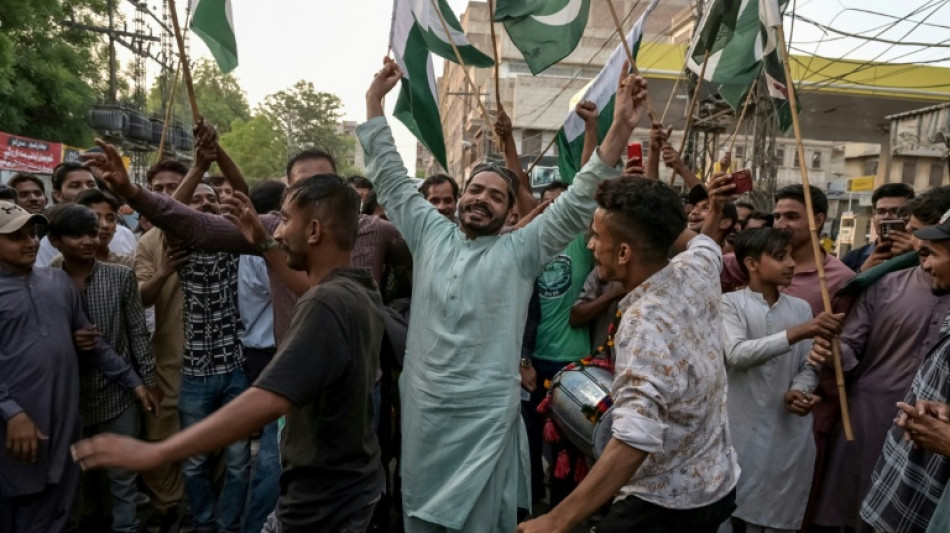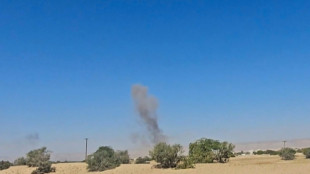

India claims Pakistan violated truce, says it is retaliating
India accused Pakistan of violating a fragile ceasefire agreement Saturday and said it was retaliating, hours after US President Donald Trump announced that the nuclear-armed neighbours had stepped back from the brink of full-blown war.
There was no immediate response from Pakistan to the claim from Indian foreign secretary Vikram Misri, who said there had been "repeated violations" and that India's "armed forces are giving an adequate and appropriate response to these violations."
Earlier, AFP staff in Srinagar in Indian-administered Kashmir reported hearing a series of loud explosions. A senior official in Pakistani-run Kashmir told AFP that "intermittent exchange of fire is ongoing" across the de facto border in the contested region, the Line of Control (LoC).
More details were not immediately available, and it was not possible to independently verify the claims.
The claims came after Pakistan and India had agreed to a full and immediate ceasefire after days of deadly jet fighter, missile, drone and artillery attacks which killed at least 60 people and saw thousands of civilians flee their homes along their border as well as in divided Kashmir.
The news had been surprisingly announced by Trump.
"After a long night of talks mediated by the United States, I am pleased to announce that India and Pakistan have agreed to a FULL AND IMMEDIATE CEASEFIRE. Congratulations to both Countries on using Common Sense and Great Intelligence," Trump posted.
Misri had said earlier that both sides would "stop all firing and military action on land, air and sea" with effect from 5:00 pm (1130 GMT).
In a statement on X, Pakistan Prime Minister Shehbaz Sharif said his country "appreciates" the US intervention.
"Pakistan believes this marks a new beginning in the resolution of issues that have plagued the region and prevented its journey toward peace, prosperity and stability," he wrote.
- Attacks and counter-attacks -
The conflict was touched off by an attack last month in the Indian-administered side of Kashmir that killed 26 tourists, mostly Hindu men, which Delhi blamed on Islamabad.
India accused the Pakistan-based Lashkar-e-Taiba -- a UN-designated terrorist organisation -- of carrying out the attack, but Islamabad has denied any involvement and called for an independent probe.
Militants have stepped up operations in Kashmir since 2019, when Indian Prime Minister Narendra Modi's Hindu nationalist government revoked its limited autonomy and took the state under direct rule from New Delhi.
The countries have fought several wars over the territory, which both claim in full but administer separate portions of since gaining independence from British rule in 1947.
"The ceasefire is a positive step," said Bilal Shabbir, an IT consultant in Muzaffarabad, in Pakistan-administered Kashmir, before the claims the truce had been violated.
"In war, it's not just soldiers who die, it's mostly civilians -- and in this case, it would have been the people of Kashmir."
In Srinagar, resident Sukesh Khajuria was more cautious.
"The ceasefire is welcome, but it's difficult to trust Pakistan. We have to be vigilant," he said.
Both sides will pay a high price economically for the conflict.
Pakistani military sources claimed its forces had shot down at least 77 Israeli-made high-tech drones -- debris from some of them was seen by AFP reporters -- while Indian officials said they had destroyed hundreds of Pakistani drones, many Turkish-made.
Pakistan also says it downed five Indian warplanes -- including three French Rafale fighter jets -- although New Delhi has not confirmed any losses.
Independent verification of claims by either side has been difficult.
US Secretary of State Marco Rubio said the ceasefire came after he and Vice President JD Vance engaged with senior officials on both sides.
He also said on X that they had agreed to "start talks on a broad set of issues at a neutral site."
News of the ceasefire was met with a sigh of relief internationally, after increasing calls in recent days for both countries to step back from the brink.
China, which borders India and Pakistan, said Beijing was "willing to continue playing a constructive role" and remained concerned with any escalation, according to state-run news agency Xinhua, which said that Chinese Foreign Minister Wang Yi had spoken to officials in both countries.
Iranian foreign ministry spokesman Esmaeil Baqaei called on both countries "to use this opportunity to ensure a reduction in tensions and lasting peace in the region".
burs-st/sst
J.Wilson--PI




